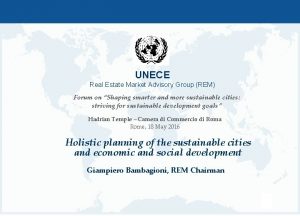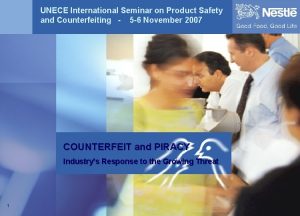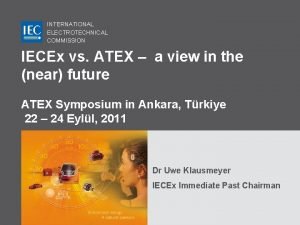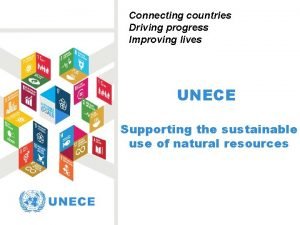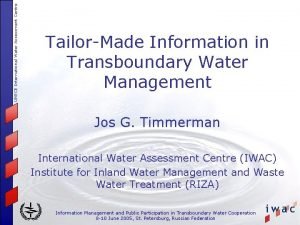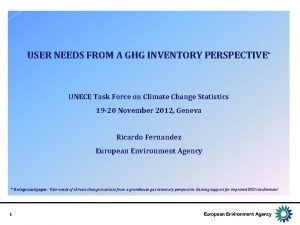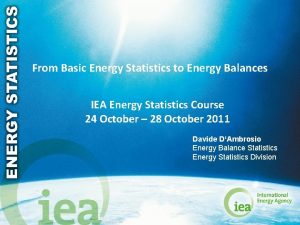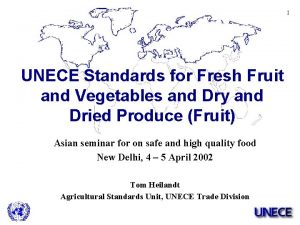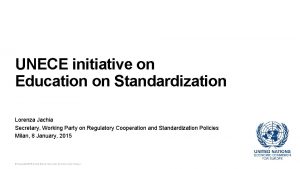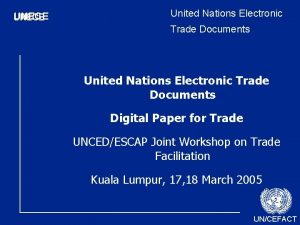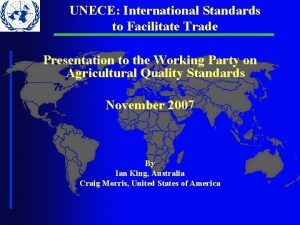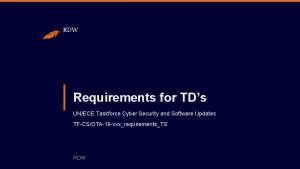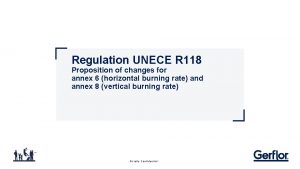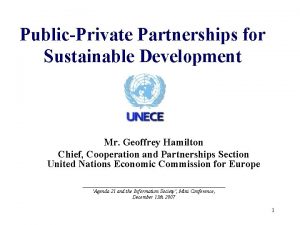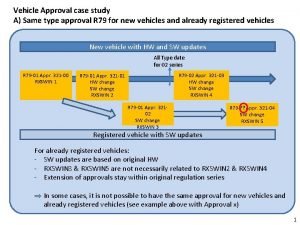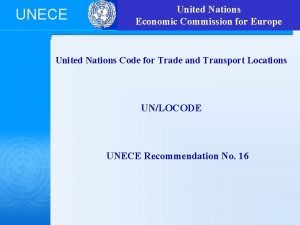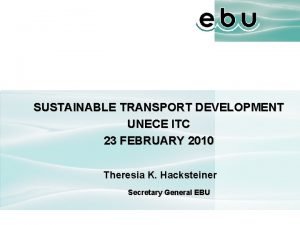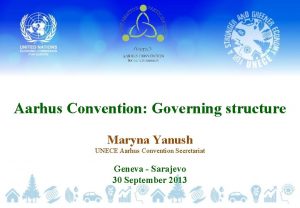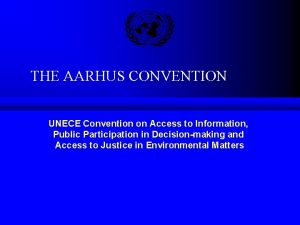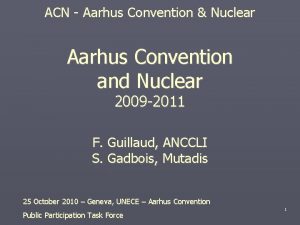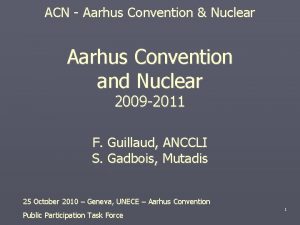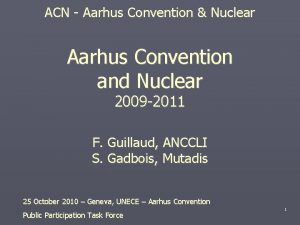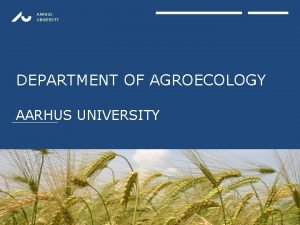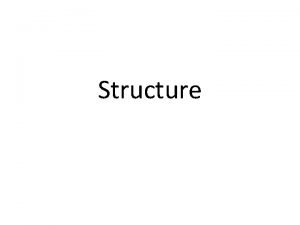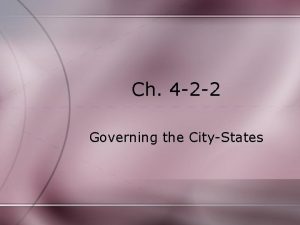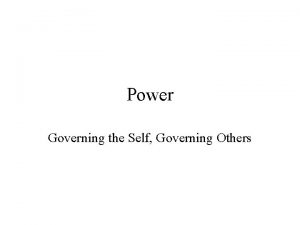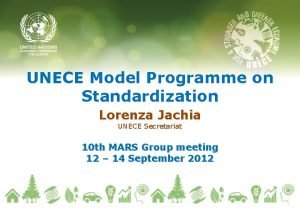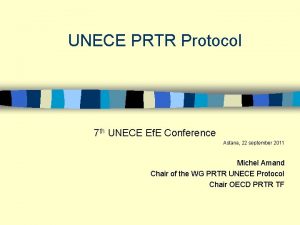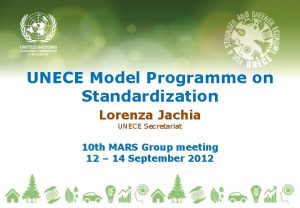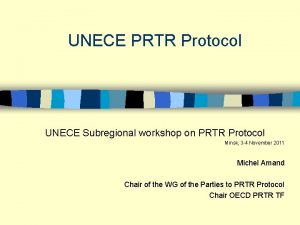Aarhus Convention Governing structure Maryna Yanush UNECE Aarhus






















- Slides: 22

Aarhus Convention: Governing structure Maryna Yanush UNECE Aarhus Convention Secretariat Geneva - Sarajevo 30 September 2013

Compliance Mechanism Soft Mechanism Not a tribunal Consultative nature Compliance Committee Nonconfrontational

Framework for the review of compliance Article 10 of the Convention Decision I/7 Guidance document – Modus Operandi

Triggers for the review of compliance Committee Review of Party’s compliance with its obligations under the Convention Submission Parties Referrals Secretariat Communications The public

Nature of alleged noncompliance • A specific case of person’s rights being violated as a result of non-compliance • A general failure to implement the provisions of the Convention by the Party concerned, or • A failure to implement correctly the certain provisions of the Convention by the Party concerned

Public trigger RECEIPT OF COMMUNICATION DETERMINATION OF ADMISSIBILITY CIRCULATION OF COMMUNICATION AND POSTING IT ON-LINE RESPONSE BY THE PARTY CONCERNED DISCUSSION (PUBLIC HEARING) DRAFT FINDINGS AND RECOMMENDATIONS ADOPTION OF FINDINGS AND RECOMMENDATIONS MOP DECISION ON COMPLIANCE BY AN INDIVIDUAL PARTY

Determination of admissibility – any communication to be considered unless… Anonymous An abuse of the right to make such communication Manifestly unreasonable Incompatible with Decision I/7 or with the Convention The Committee takes into account any available domestic remedies unless their application is unreasonably prolonged or obviously does not provide an effective and sufficient means of redress

Case study: Albania Alliance for the Protection of the Vlora Gulf • Complaint: Establishment of major industrial and energy park Compliance Committee • Non-Compliance • Reason: Public had not been properly informed or consulted • Recommendations on improving compliance Meeting of the Parties ( Mo. P-3) • Decision on noncompliance Meeting of the Parties (Mo. P 4) Albania No longer in a state of non-compliance Committee and Albanian Authorities • Dialogue • Albania reported on measures taken to fulfil its obligations

Compliance with the Convention Specific tools • Mo. P decisions on non-compliance • Compliance Committee Findings and Recommendations • Case law of the Compliance Committee (publication of the European ECO Forum) • Guidance document on the Aarhus Convention Compliance Mechanism

Issues raised at the review of compliance Access to information Access to justice Public Participation

Access to information Defining environmental information (C/21, EU, para. 35) 35. Therefore, while the Convention does not require a person making an information request to explicitly refer to (a) the Convention itself, (b) the implementing national legislation or (c) even the fact that the request is for environmental information, any or all such indications in the request would, in practice, facilitate the work of the responsible public authorities and help in avoiding delays. This is particularly so where only part of the requested information constitutes environmental information as defined in article 2, paragraph 3, of the Convention, or where the relevance of the requested information to the environment might not be obvious at first glance.

Access to information No interest should be stated (C/37, Belarus, para. 71; C/36, Spain, para. 69) C/37 para. 71. … The Committee notes that the statement of a specific interest is not included in the grounds that may justify the refusal of the public authorities to provide access to information, which are listed in article 4, paragraphs 3 and 4, of the Convention. Besides, article 4, paragraph 1 (a), of the Convention specifically provides that the requested information shall be available “without an interest having to be stated”. C/36 para. 69. The Committee finds that as a result of public authorities not making the requested information available unless an interest was stated on the part of the requester, the Party concerned failed to comply with article 4, paragraph 1, of the Convention (see para. 54 above).

Access to information Concept of “public authority” (C/37 Belarus, paras. 67 -68) 67. The Committee considers that it is not conflicting with the Convention when national legislation delegates some functions related to maintenance and distribution of environmental information to private entities. Such private entities, depending on the particular arrangements adopted in the national law, should be treated for the purpose of access to information as falling under the definition of a “public authority”, in the meaning of article 2, paragraph 2 (b) or (c) of the Convention. 68. In this context, the Committee notes that in Belarus the Environmental Expertiza Law and the relevant Instructions make the developer responsible for maintaining the OVOSand expertiza-related documentation. Therefore, for the purpose of access to information issues, which are the subject of the present communication, the developer should be treated as a public authority under the obligation to provide access to environmental information in compliance with the requirements of article 4 of the Convention.

Access to information Financing agreements as environmental information Financing agreements, even though not listed explicitly in the definition of environmental information under article 2, paragraph 3 (b), may sometimes amount to “measures … that affect or are likely to affect the elements of the environment” as set out in article 2 (b) of the Convention (C/12 (Albania), para. 67). . whether the provisions of a financing agreement are to be regarded as environmental information cannot be decided in a general manner, but has to be determined on a case-by-case basis (C/21 (European Union), para. 30).

Public participation in decision-making The activities covered by the Convention (C/35, Georgia) 43. Article 6, paragraph 1 (a) applies to decisions on whether to permit proposed activities listed in annex I to the Convention. Forest use and management activities are not listed in this annex to the Convention. However, paragraph 20 of the annex also includes all activities that according to domestic law require EIA with public participation. The Committee observes that the determination of whether an activity falls within the ambit of paragraph 20 of annex I to the Convention depends on three elements, namely: (i) public participation; (ii) EIA in the context of which public participation takes place; and (iii) domestic legislation providing for EIA. 46. The Committee notes that even if paragraph 20 of annex I to the Convention refers to the taking place of an EIA, national legislation may provide for a process that includes all basic elements for an EIA, without naming the process by the term “EIA”. Such a de facto EIA process should also fall within the ambit of annex I, paragraph 20. It is critical, however, to define the extent to which the de facto EIA process qualifies as an EIA process, even if it is not termed as such.

Public participation in decision-making The role of developer (C/16, Lithuania, para. 78) 78. However, the above reliance on the developer in providing for public participation in fact raises doubts as to whether such an arrangement is fully in line with the Convention. Indeed, it is implicit in certain provisions of article 6 of the Convention that the relevant information should be available directly from public authority, and that comments should be submitted to the relevant public authority (article 6, paragraph 2 (d) (iv) and (v), and article 6, paragraph 6). Accordingly, reliance solely on the developer for providing for public participation is not in line with these provisions of the Convention.

Public participation in decision-making Early public participation when all options are open (C/12, Albania, para. 79) 79. A question with regard to the stage of a decision-making process at which public consultations should take place was raised in the commenting on the draft of these findings and recommendations. In this regard, the Committee wishes to make clear that once a decision to permit a proposed activity in a certain location has already been taken without public involvement, providing for such involvement in the other decision-making stages that will follow can under no circumstances be considered as meeting the requirement under article 6, paragraph 4, to provide “early public participation when all options are open”. This is the case even if a full environmental impact assessment is going to be carried out. Providing for public participation only at that stage would effectively reduce the public’s input to only commenting on how the environmental impact of the installation could be mitigated, but precluding the public from having any input on the decision on whether the installation should be there in the first place, as that decision would have already been taken. The Committee has already expressed this view in some of its earlier findings and recommendations

Public participation in decision-making Due account of the comments received (C/24, Spain, para. 99 and 100) 99. Furthermore, it is quite clear to the Committee that the obligation to take due account in the decision of the outcome of the public participation cannot be considered as a requirement to accept all comments, reservations or opinions submitted. However, while it is impossible to accept in substance all the comments submitted, which may often be conflicting, the relevant authority must still seriously consider all the comments received. 100. The Committee recalls that the obligation to take “due account” under article 6, paragraph 8, should be seen in the light of the obligation of article 6, paragraph 9, to “make accessible to the public the text of the decision along with the reasons and considerations on which the decision is based”. Therefore the obligation to take due account of the outcome of the public participation should be interpreted as the obligation that the written reasoned decision includes a discussion of how the public participation was taken into account.

Access to justice Issues to consider C 11, Belgium - 37. When evaluating whether a Party complies with article 9, paragraph 3, the Committee pays attention to the general picture, namely to what extent national law effectively has such blocking consequences for environmental organizations, or if there are remedies available for them to actually challenge the act or omission in question. C 11, Belgium - 35. While referring to “the criteria, if any, laid down in national law”, the Convention neither defines these criteria nor sets out the criteria to be avoided. Rather, the Convention is intended to allow a great deal of flexibility in defining which environmental organizations have access to justice. On the one hand, the Parties are not obliged to establish a system of popular action (“actio popularis”) in their national laws with the effect that anyone can challenge any decision, act or omission relating to the environment. On other the hand, the Parties may not take the clause “where they meet the criteria, if any, laid down in its national law” as an excuse for introducing or maintaining so strict criteria that they effectively bar all or almost all environmental organizations from challenging act or omissions that contravene national law relating to the environment.

Access to justice Standing and the “infringement of rights” doctrine (C/50, Czech Republic) 66. While narrower than the definition of “the public”, the definition of “the public concerned” under the Convention is still very broad. Whether a member of the public is affected by a project depends on the nature and size of the activity. Also, whether members of the public have an interest in the decision-making depends on whether their property and other related rights (in rem rights), social rights or other rights or interests relating to the environment may be impaired by the proposed activity. Importantly, this provision of the Convention does not require an environmental NGO as a member of the public to prove that it has a legal interest in order to be considered as a member of the public concerned. Rather, article 2, paragraph 5, deems NGOs promoting environmental protection and meeting any requirements under national law to have such an interest. 67. A tenant is a person who holds, or possesses for a time, land, a house/apartment/office or the like, from another person (usually the owner), usually for rent. An activity may affect the social or environmental rights of the tenants, especially if they have been or will be tenants for a long period of time. In that case, to a certain extent, the interests of the tenants would amount to the interests of the owners. Although the relationship of the tenant to the object is always intermediated, since tenants, even short term tenants, may be affected by the proposed activity, they should generally be considered to be within the definition of the public concerned under article 2, paragraph 5, of the Convention and should therefore enjoy the same rights as other members of the public concerned.

Access to justice Effective remedies – injunctive relief (C/24, Spain) 105. The Committee finds … a system where citizens cannot actually obtain injunctive relief early or late; it indicates that while injunctive relief is theoretically available, it is not available in practice. As a result, the Committee finds that the Party concerned is in non-compliance with article 9, paragraph 4, of the Convention, which requires Parties to provide adequate and effective remedies, including injunctive relief.

Thank you! Contact: public. participation@unece. org




